Disastrous Climate Wake Up
Air Date: Week of October 4, 2024
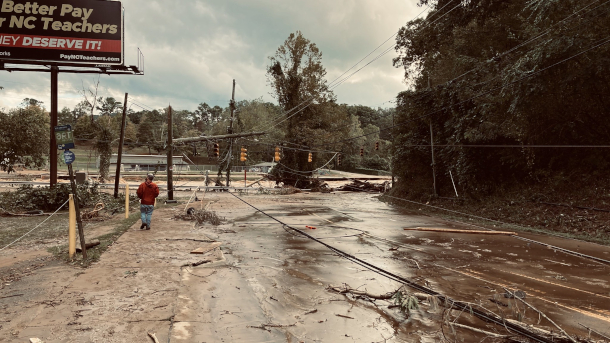
Hurricane Helene devastated towns as far inland as Asheville, NC. (Photo: Bill McMannis, Flickr, CC BY 2.0)
Hurricane Helene brought devastating storm surge and winds to the Gulf Coast and deadly floods to the inland mountains of North Carolina. Journalist Abrahm Lustgarten is the author of On the Move: The Overheating Earth and the Uprooting of America and joins Host Steve Curwood to discuss the societal toll of repeated climate-fueled disasters and whether this latest super cyclone might prove a tipping point for greater climate awareness and action.
Transcript
DOERING: From PRX and the Jennifer and Ted Stanley Studios at the University of Massachusetts, Boston, this is Living on Earth. I’m Jenni Doering.
CURWOOD: And I’m Steve Curwood.
It may be weeks and months and even years before we fully understand the catastrophic impact of the Super Hurricane, Helene. Still over water Helene first flattened many shoreside communities along the Gulf coast of Florida before it ripped ashore in North Florida and rampaged through five more states, leaving many in its path without working roads, power, food, and water. Helene’s huge size and speed are linked to increasingly hotter water in the Gulf of Mexico, and a stark reminder that with global heating, weather forecasts based on history are becoming poorer guides to present dangers. Hurricanes have usually weakened when they make landfall, but to the surprise of many, Helene’s impact was just as devastating in the inland mountains of western North Carolina as on the Gulf coast of Florida. Gargantuan amounts of moisture drenched hills and valleys of the region with water that had nowhere to go but down into homes, businesses, roads, and bridges along the swollen rivers and streams. As we record this broadcast, the death toll is nearing 200, with many others still missing, and the final numbers could be much higher. On the line now is Abrahm Lustgarten, journalist and author of “On the Move: The Overheating Earth and the Uprooting of America”. Abrahm, welcome back to Living on Earth.
LUSTGARTEN: Hi there. Thanks for having me.
CURWOOD: Abrahm, what role does climate denialism play in the wake of disasters like Hurricane Helene? I mean, to what extent can communities turn a blind eye here, continue to turn a blind eye here?
LUSTGARTEN: This is a difficult question for me to answer. I mean, I think politically, climate denialism will make it difficult for certain people in certain places to have a forthright conversation about what has just happened to their towns, to their homes, to their cities, and that's going to make a policy response or a decision about what kind of government response people expect, difficult to arrive at. On the other hand, my experience socially in talking to a lot of people through the course of my reporting is that there is an undeniable sense and a real consensus among all types of different political views that the environment around them is rapidly changing, and that is changing in disruptive ways. And I hear this in all sorts of ways. I hear from conservative homeowners on the coast of Florida that they were just surprised to see a flood coming again year after year, that they remember hurricanes from years past. And hurricanes are a normal part of living on the Gulf Coast, but they don't remember them being so destructive and so frequent and so that might not be a person who is politically supportive of the idea of climate change, but that is an acknowledgement of what we all see happening around us, which is that the present doesn't feel like it's matching the patterns of the past, and that the environmental change is something that people are concerned about. And so, in that, I think there's a certain consensus, and Helene and the records that it is shattering will contribute, I believe, to a hardening of that consensus that we live in a new era.
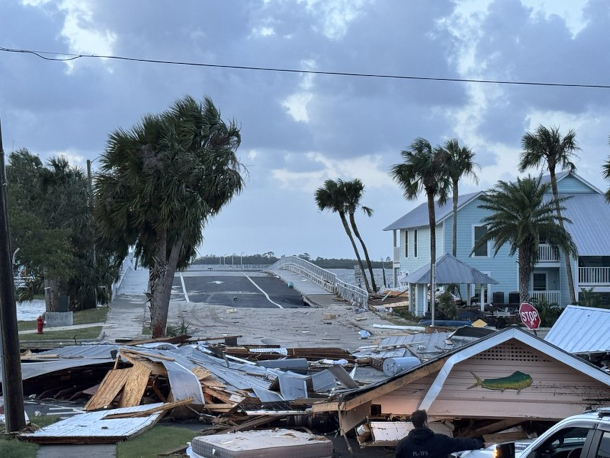
The Gulf Coast of Florida has been pummeled multiple times by disasters like Hurricane Helene, which can make some homeowners rethink where they want to live. (Photo: Florida Fish and Wildlife, CC BY-NC-ND 2.0)
CURWOOD: So, we don't really know in dollar terms what the economic impact of Helene will prove to be. Those measurements will be taken in the years ahead. But if the insurance risk is 150 billion, a lot of people lost their jobs, lost their livelihoods, are out of work, are seeing the ability to sell their homes really decline. To what extent is the climate emergency a threat to our entire economy do you think?
LUSTGARTEN: Well, it's a huge threat to our entire economy. The research alone has already predicted long before this storm that climate pressures will create a drag on the national economy, 1.2% of GDP annually per single degree, per one degree of Celsius of warming, is the estimate that's in published, peer reviewed papers. And those estimates increase dramatically for the most vulnerable parts of the country, so parts of the Gulf Coast Florida, the counties that are closest to hurricane risk, for example, they're projected to see economic drags of up to 60% of their local GDP. So, there's already kind of a baked in assumption that the effects of climate change are going to make it harder and harder to have a vibrant and thriving economy. And part of what we're seeing when we talk about the costs of a disaster like Helene is, well, part of it is, what does it cost to rebuild and to make those people that were directly affected whole? Part of it, though, is going to be, what does it cost the federal government? What does it cost the National Flood Insurance Program? What do we choose to invest in it, in terms of not only aid to help people recover, but then all of the infrastructure investments and the policy changes that come afterwards, which will also be very expensive to try to build back these communities and to try to make them more sustainable and stronger in the future. And then what happens if and when we see another disaster that overlaps on this one, which is increasingly likely with climate change, so that basically, the costs of this one are not fully repaid before we have to start to pay the similar costs of the next one? And that's the kind of snowballing effect that can start to seem really scary to the economists that I talk to.
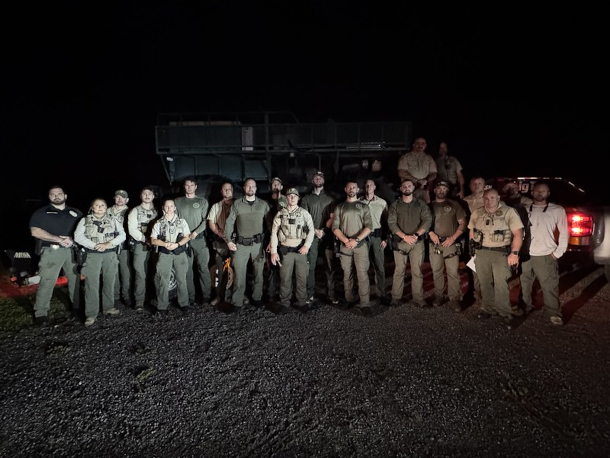
Our guest, Abrahm Lustgarten, imagines there may be a point in the future where basic emergency services could be hard to come by in particularly vulnerable locations. (Photo: Florida Fish and Wildlife, Flickr, CC BY-NC-ND 2.0)
CURWOOD: And what about the social and emotional costs here? Abram, I know you're not a psychologist, you're not a social psychologist, but you talk to many people in preparing your book about the uprooting of America. What do you hear are the social and emotional costs of disasters like this?
LUSTGARTEN: Well, first of all, I mean, my heart goes out to people who are impacted by this storm. The kind of destruction that I think we've all been looking at in newsreels is absolutely heartbreaking. And in my experience, talking to people who are affected in that way, I mean, obviously every person is different, and there's a spectrum of reactions. And some people will be immediately dislodged from their lives by an experience like this, and they will, might move, or they might make dramatic changes. Many other people will be resilient to a degree, and this is probably much more common. And you know, in the course of my reporting on migration, it takes many, many small impacts or incidents like this to add up to a decision to move or to migrate, and so if you look at a storm like Helene in that context, then I would think we have a gradation of its psychological impacts on people. That there are people who are on the Gulf Coast, who are in parts of Florida for whom this is the fifth disaster or the 10th disaster that they lived through. Some of them I've seen interviewed had just finished putting up the sheetrock on the repairs from what happened last year. And those people are very vulnerable and closer on the spectrum to giving in to that relentless drumbeat of bad news and risk, then maybe somebody in Asheville, North Carolina, for whom this storm was a surprise, for whom maybe they hadn't experienced an event like this before, so I'm sure that it shakes everybody you know, really to their core. But on the spectrum of what makes somebody actually move, there's really a gradation, depending on how many times this has happened to you.
CURWOOD: Abrahm, we have storms now that are traveling much farther inland than we expected. They're wetter, slower, more destructive. Some respects, it feels overwhelming. From your perspective and what people have told you, what’s to be done?
LUSTGARTEN: Well, I think that we are in an era where we have to anticipate the unexpected and we have to understand the limits of what we can know, and if you want to translate that uncertainty to hard plans, those plans might look like living and developing a community around a worst-case scenario instead of a fingers crossed scenario. And I don't know the community of Asheville very well, but I imagine that that might mean developing beyond the furthest reaches of the floodplain for worst case scenario, for example, or imagining that every storm could potentially have the kind of unexpected impacts that we saw in this storm. And that's really a reversal from how we've lived in the past, where we trust the data of history to inform the data of the future. And what it means to be in an era of discontinuity is that you can't trust that data anymore, and so you have to guess about how bad it could be. And if we can wrap our minds around a guess, a planning, a physical planning, you know, paradigm that imagines the worst case, then we can keep ourselves kind of beyond the boundaries of that worst case at least a little bit more reliably.
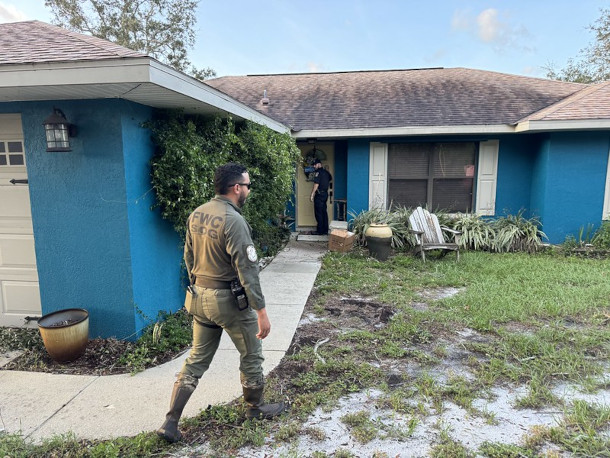
A Florida Fish and Wildlife Service member conducts a wellness check after Hurricane Helene. (Photo: Florida Fish and Wildlife, Flickr, CC BY-NC-ND 2.0)
CURWOOD: Of course, preparing for that worst case costs a lot of money that people think that is a waste of money.
LUSTGARTEN: So, I talk about this a lot, and it's one of the more depressing elements of the climate adaptation story, I think, for the United States, and that's that the costs of adapting to climate change are going to prove so unfathomably expensive that I don't think that we collectively, or that our governments, can really wrap their minds around that yet. And the flip side of what that investment will require is what I believe is the reality, the truth that certain places will never be able to afford that adaptation, and this may be a very long ways into the future, and it depends on the frequency of disasters, but there will become places that are unprotectable, where we cannot afford to rebuild, where we cannot afford to build in the way that is truly resilient, because it is too expensive. And we're more likely as a society, to spend that money and make those investments in the larger urban places where there's a collectivization of the services and community support for the population that lives there. And so I think that, and we're trending into, like science fiction, you know, realm here, or at least my imagining of the future, but when I try to imagine what a community that is failing on the far end of this transition looks like the researchers that I talk to tell me to expect the disappearance of publicly provided services like garbage pickup, like 911 service and emergency services, and like the availability of insurance and those sort of basic community fundamentals first, and that might follow the decrease of a tax base that dwindles as the population shrinks, which also precipitates a drop in the quality of schools and a drop in the quality of infrastructure. So, all of these things start to sort of self-perpetuate and spiral downwards, and then once you lose that consistency of services and economic stability, I think of it as communities kind of de-evolving back into, I guess, what we would call a rural state, where eventually you have people who have to be self-sufficient and self-dependent in order to live there.
CURWOOD: So, Abrahm, what are the odds that Helene might just prove to be a tipping point for awareness of the growing risk from climate disruption in this country, and that there'll be broader acceptance in, in taking steps to both reduce our emissions and also to adapt to the effects of the emissions that have already been made.
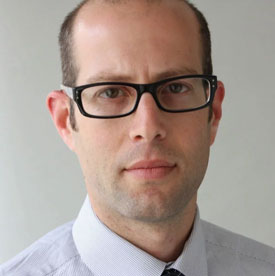
Abrahm Lustgarten is a senior environmental reporter with ProPublica. (Photo: ProPublica)
LUSTGARTEN: I think there's a good chance that Helene alters the conversation. It depends in part on how that conversation is framed in the coming days and in the coming weeks, and whether we discuss what's happened in the context of climate change, and whether the attribution science comes out and says that Helene was significantly influenced by climate change. I mean, all of those things will steer this conversation, but I think that there's no doubt that the frustration and danger and horror experienced by so many people, particularly on the Gulf Coast, is reaching a saturation point of sorts that I would expect to change the conversation around climate change. And there's no doubt that in places like Asheville, North Carolina, that the level of surprise, of sort of dumbfoundedness that something like this could happen in this way from a hurricane that came off the coast and that it could dump so much water so quickly. I think that's a different kind of but similar kind of awakening. And absolutely, there will be fresh conversations in those parts of the country about whether this was climate caused, and what that means, if you're trying to imagine this happening repeatedly, what that means for your life and your future, and those are the seeds, then, for what will translate, one would hope, to offering political support for climate action, or supporting changes in lifestyle and behavior and consumption that lead to lowering emissions and so forth. And I think that's really what we're talking about when we talk about, do people see this as a turning point in their acknowledgement of climate change? Are they willing to do something about it?
CURWOOD: Abrahm Lustgarten is a journalist. His latest book is called “On the Move: The Overheating Earth and the Uprooting of America”. Thanks so much for taking the time with us again.
LUSTGARTEN: Thanks for having me on.
Links
Living on Earth wants to hear from you!
Living on Earth
62 Calef Highway, Suite 212
Lee, NH 03861
Telephone: 617-287-4121
E-mail: comments@loe.org
Newsletter [Click here]
Donate to Living on Earth!
Living on Earth is an independent media program and relies entirely on contributions from listeners and institutions supporting public service. Please donate now to preserve an independent environmental voice.
NewsletterLiving on Earth offers a weekly delivery of the show's rundown to your mailbox. Sign up for our newsletter today!
 Sailors For The Sea: Be the change you want to sea.
Sailors For The Sea: Be the change you want to sea.
 The Grantham Foundation for the Protection of the Environment: Committed to protecting and improving the health of the global environment.
The Grantham Foundation for the Protection of the Environment: Committed to protecting and improving the health of the global environment.
 Contribute to Living on Earth and receive, as our gift to you, an archival print of one of Mark Seth Lender's extraordinary wildlife photographs. Follow the link to see Mark's current collection of photographs.
Contribute to Living on Earth and receive, as our gift to you, an archival print of one of Mark Seth Lender's extraordinary wildlife photographs. Follow the link to see Mark's current collection of photographs.
 Buy a signed copy of Mark Seth Lender's book Smeagull the Seagull & support Living on Earth
Buy a signed copy of Mark Seth Lender's book Smeagull the Seagull & support Living on Earth

